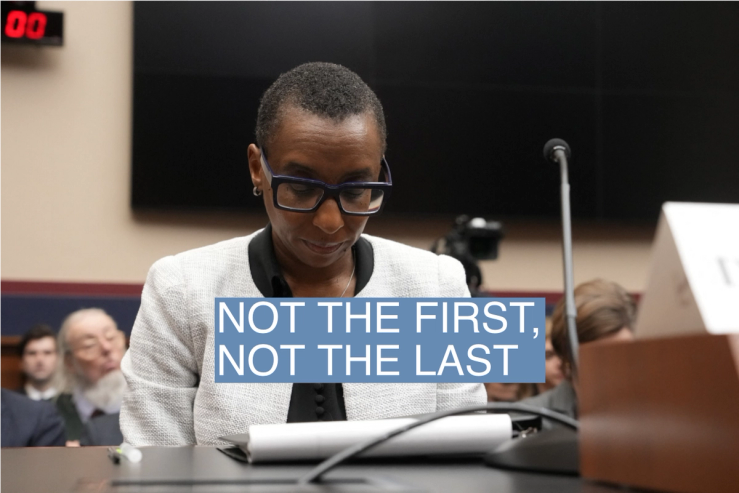The Scoop
The battle over free speech and antisemitism that has swept across America’s elite college campuses has so far left its biggest companies alone. That may change soon.
A small group of lawyers and investors is sketching out plans to use the machinery of corporate law to pressure companies to roll back diversity, equity, and inclusion policies that they adopted en masse in recent years as social-justice matters careened into the boardroom.
The theory, members of the loose coalition said, is that preferential hiring may have deprived shareholders of the best talent, a potential breach of boards’ duties to shareholders. And if workplace policies are unequally applied — if, for example, HR complaints lodged by one racial or religious group are investigated more thoroughly than those from others — companies may have violated federal employment laws.
The discussions show that this fight won’t end with the resignations of the presidents of Harvard and Penn, and how the loudest critics of those administrations — most of them hailing from the business world — are pulling levers they know well to press their cause. And while they’ll be cast in the neutral language of shareholder law and process, they could represent a dramatic new attack on the push in recent years for more diverse workforces.
“Shareholders have every right to question whether the DEI programs that made us feel good in the past are now unjustified because their true economic and social effect is simply replacing one form of discrimination with another,” said Mark Lebovitch, a veteran plaintiffs’ lawyer who has been part of the talks.
The effort would start with a request for HR data at a handful of companies, including on hiring and how discrimination claims have been handled. (Any shareholder can ask to see a company’s internal records, usually trying to gather ammunition for a lawsuit, and it’s up to a judge to decide whether they get a look.)
Even before the current battle, conservative groups were taking their grievances against corporate “wokism” to the courts, emboldened by last year’s Supreme Court decision striking down affirmative action at universities.
In this article:
Liz’s view
Bloomberg’s Matt Levine often says that “everything is securities fraud:” A company secretly does a bad thing and when everyone finds out about it or regulators punish them for it, the stock falls. Saying they misled investors is a shortcut to a civil lawsuit.
Another road to the courthouse is the notion that “everything is a breach of fiduciary duty.” Boards of directors have a legal obligation to ensure their companies do things that make money for shareholders and don’t do things that lose money for shareholders. If they fail to do that, they get sued.
The new attack on DEI is taking this approach, which is likely to rattle some CEOs and board members who find themselves personally named as defendants. But it might also give many of them air cover to backtrack from policies they have come to regret.
Executives are now being vilified for the diversity policies they were pushed to embrace in the wake of #MeToo, George Floyd’s murder, and the broader social-justice sweep of the late 2010s. A lot of them regret that turn and, as I wrote a few months ago, are “desperate to drop the do-gooderism, quit getting yelled at by Vivek Ramaswamy, and get back to business.”
The View From Seattle
In one closely watched case, a federal judge in September dismissed a shareholder lawsuit claiming that Starbucks’ diversity goals violated federal civil rights laws.
“Despite increasing scrutiny of DEI policies, there will be substantial defenses to [shareholder] litigation in this area,” attorneys at the corporate law firm Gibson Dunn wrote in the wake of the Starbucks ruling. “Courts tend to disfavor judicial meddling with reasonable and legal decisions made by the board of directors of public corporations.”
Notable
- “Quite frankly, the most risky thing an employer can do is make any employment decision explicitly on the basis of race” — Washington Post
- “Companies are really starting to look at other ways to do the work without saying that they’re doing the work.” — Axios


